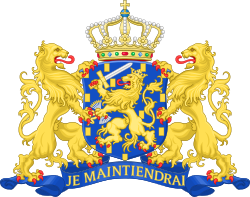| Part of the Politics series |
 |
|---|
| |
Partial general elections were held in the Netherlands on 12 and 26 June 1860 to elect 36 of the 72 seats in the House of Representatives. [1]
| Part of the Politics series |
 |
|---|
| |
Partial general elections were held in the Netherlands on 12 and 26 June 1860 to elect 36 of the 72 seats in the House of Representatives. [1]
Of the 72 seats in the House of Representatives, 9 were elected in single-member constituencies using the two-round system.
The other 63 were elected using two-round plurality block voting in 29 constituencies from 2 to 6 seats. To be elected in the first round, a candidate had to reach an electoral threshold of 50% of the number of valid votes cast, divided by the number of seats up for election in the district.
| Party | Votes | % | Seats | |
|---|---|---|---|---|
| Liberals | 40 | |||
| Conservatives | 18 | |||
| Conservative Liberals | 10 | |||
| Anti-Revolutionaries | 4 | |||
| Total | 72 | |||
| Total votes | 35,296 | – | ||
| Registered voters/turnout | 85,228 | 41.41 | ||
| Source: Bromley & Kossman, [2] Nohlen & Stöver | ||||